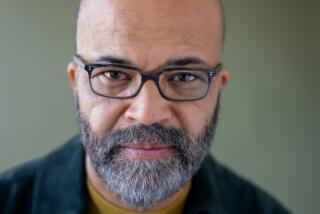Q&A: Producer Brian Grazer stays curious and writes about how he does it

There’s little time for conversation starters with Brian Grazer.
The restless Hollywood producer is scuttling down Sunset Boulevard on a recent afternoon, his research assistant behind the wheel, trying to make it to his son’s baseball game after an interview with “Hardball’s” Chris Matthews on the Universal lot. And even though he’s not navigating the rush hour traffic himself, it’s clear Grazer is in multi-task mode — he sometimes apologizes midstream when an answer meanders, wonders aloud about dinner reservations or mutters that he needs to make a note to himself to send an email to Netflix content chief Ted Sarandos.
But this seems strangely appropriate for a man whose career has been shaped by winding conversation. In his new book, “A Curious Mind: The Secret to a Bigger Life” (Simon & Schuster: 320 pp., $25.99), Grazer chronicles a lifetime of talking to strangers in an attempt to expand his own capabilities; he says he hopes the book drives others to do the same.
FULL COVERAGE: FESTIVAL OF BOOKS
The underlying theme of the book is embracing the inquiring mind. He writes, “Curiosity has never let me down — just the opposite. The only questions I regret are the ones I haven’t asked.”
These days, as co-founder of Imagine Entertainment (along with Ron Howard), Grazer is best known for having produced dozens of films, including “Apollo 13” (1995) and “A Beautiful Mind” (2001), as well as television series like “Arrested Development,” “24” and this year’s “Empire.” Since the beginning of his career, Grazer has let his inquisitiveness run wild by pursuing what he refers to as a “curiosity conversation” with hundreds of movers and shakers — not just entertainment industry figures but any thinker who fascinates him. The secret to Grazer’s chats? He says it’s in letting the subjects know he has no agenda, allowing the conversation to flow freely.
The tête-à-têtes began when he was a law clerk at Warner Bros. and he got himself an audience with producers David Picker (“The Crucible”) and Frank Yablans (“Mommie Dearest”) and MCA head Lew Wasserman — separately. Since then he’s logged time with the likes of Apple’s Steve Jobs, Oprah Winfrey, as well as scientist (and developer of the first polio vaccine) Jonas Salk and Barack Obama (during his Senate years).
INTERACTIVE GAME: HOW TO BE A WRITER
Although his passion for talking began as a hobby, it has become as much of a trademark as his spiky coif. He remembers Charlie Rose inviting him to be a guest on his PBS talk show a decade ago and telling him, “I don’t want to talk about ‘24’ or any movie. I just want to talk about this thing I heard that you do where you go meet somebody every two weeks.”
He says Rose later encouraged him to write a book about his conversations.
“I thought it would be too egotistical or something — like I had figured out life,” Grazer says. “I’m the last person to figure out life.’ But a few years ago his agent nudged him toward a similar idea. “It was a liberator, and I immediately was game,” Grazer adds. (He teamed with business journalist Charles Fishman on the book.)
At 63, Grazer still finds tapping curiosity useful for building human connection and inspiring fresh ideas. There isn’t a straight line between these things, but he describes some circuitous payoffs.
His 2009 meeting with Condoleeza Rice, for example, kept him from making a movie about the Mexican drug cartel that would film on location in the beset country: “I don’t think it’s safe to do what you’re planning,” she’s noted as saying in the book. A conversation with then-Los Angeles Police Department Chief Daryl Gates that took place a day after rioting began in Los Angeles following the Rodney King beating verdict in 1992 later informed his thinking on the 2011 Clint Eastwood-directed film “J. Edgar,” in terms of understanding FBI director J. Edgar Hoover’s controlling paranoia. The list goes on.
We spoke to Grazer, who will be appearing this weekend at the Festival of Books, about the art of curiosity and the role of technology and courage in fostering ideas.
Is there an art to listening, in your view?
The methodology is really to create trust immediately. That’s usually at the first point of contact with who you’re talking to, you want to say something that is either arresting or curious or interesting or usually make a statement that is of value to the person you are talking to. To a fashion designer, you might want to talk about a piece of music you’ve heard and what you thought of it. You bring something to the table immediately that creates value and the beginning of the conversation. And then you just try to shut up and listen.... And then, what happens is, it becomes kind of molecular — combustible thoughts transpire.
That’s how breakthroughs with human beings actually happen. That’s different than doing it through the Internet. The Internet is very valuable, but it doesn’t present to you emotional disappointments....
I read that you don’t like to do the conversations over food — why?
Yeah, I don’t like to do them over food ever, if I can help it. If I have to, but — I don’t know. Your blood sugar changes when you have food. You can be really up, and then you have peaks and valleys. I mean, I know I can do two really intense, good, concentrated, focused hours without food....
Is there a specific field you find yourself most fascinated by?
I spent years talking to many Nobel laureates in science and medicine. I also liked folks in the economy field. Now, it’s technology and other art forms, obscurer art forms. But, you know, it can be anything. A month ago I talked to Floyd Mayweather. I also recently met with this young kid who was head of policy for the Middle East at the White House.
I feel like now would be a good time to do a curiosity interview with Hillary Clinton.
She’s too busy for this. I can’t ask. There’s a point where you’re just obnoxious.
Is there a courage aspect to all this?
I guess I’ve always felt that disrupting my comfort zone is a state I wanted to live my life. There’s a lot of things I am afraid of — certainly, public speaking I have a certain amount of anxiety about, but you realize that it’s an anxiety that is self-created, like a pre-anticipatory anxiety. I mean, I took up surfing, and that anxiety is like a real thing because you’re in a life or death situation. The physics of a wave could just kill you. So the idea of talking to people, I mean, it does take some courage, but it’s also preparation. You can’t go in blind because then you’re an annoying dilettante....
The genius of the person is always going to take some courage because they are always going to be superior to you, and you have to be comfortable with that. I didn’t use my expertise in the movie business or television as a weapon because I felt like that would be weird and unfair given that I’m asking them to be my guest.... I just try to learn enough where I can adapt to the way they communicate within their language, and that takes some effort when you’re talking to someone like Jonas Salk or Carlos Casteneda....
Have these conversations led you to consider a switch in jobs or made you wonder, hmm, could I have done that?
Every once and a while I’ve thought about switching careers. I do enjoy interviewing people. I like trying to locate someone’s truth — the truth of them or their state of flow into a collective consciousness. I really like doing that. Maybe being a teacher or mentor or talk show host. Or like being a teacher or mentor inside of a tech company would be interesting because I like creating narratives, and I find that you can create narratives in any area...
I know some of the conversations you’ve had with rappers and music moguls helped with “8 Mile.” Have you referred back to those for “Empire”?
I talked to so many people before I met Eminem through Jimmy Iovine. I met Chuck D. I started with Old Dirty Bastard. I was first fascinated by who could name themselves Old Dirty Bastard and feel cool about that. I couldn’t fully comprehend it. And then we met, and he was everything you would guess. He was gigantically entertaining. He also turned me on to RZA, who I feel like I have a great relationship with. I put him in “American Gangster,” I put him in a TV series. You never know when the dots will connect, or if they’ll connect. All those early rappers led to “8 Mile.” I also produced “Boomerang”... So when “Empire” came around, all the rappers that I met and having done “Boomerang,” all of that stuff kind of coalesced and help fertilize the possibility of believing this could really work....
These conversations started out when you were a nobody, but you still had the Warner Bros. name to get the foot in the door. Do you think the average person can wrangle these types of meetings?
I think they can do it. I have some very exciting stories of having met Princess Diana or Michael Jackson or Barack Obama when he was a senator, hundreds of Nobel laureates. I met Jonas Salk when I had no power.... You don’t have to target Barack Obama or Condoleeza Rice — you can just engage in a process that reaches into someone else’s psyche. You never know when these dots get created or get connected in life. This conversation with me that you’re having could have byproducts a year from now or six years from now or six weeks. You just don’t know. But you have to be open-minded and enjoy this superpower of curiosity.
Grazer will appear at the Festival of Books April 18.
More to Read
Sign up for our Book Club newsletter
Get the latest news, events and more from the Los Angeles Times Book Club, and help us get L.A. reading and talking.
You may occasionally receive promotional content from the Los Angeles Times.







